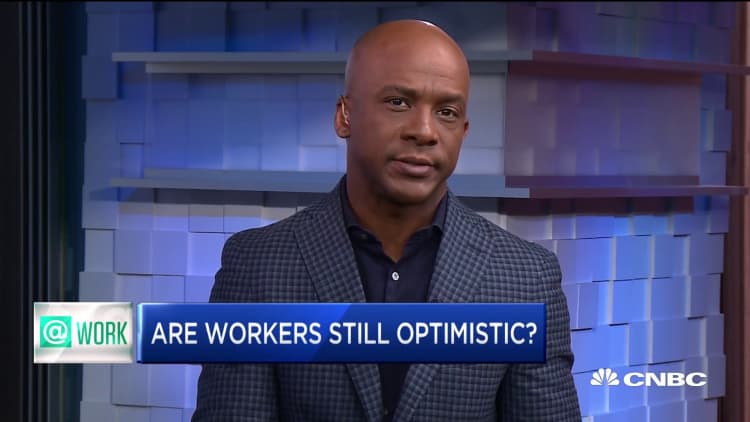The Terminator movie franchise is back, and the idea that robots and artificial intelligence are coming for us — specifically, our jobs — is a big part of the present. But the majority of the working population remains unafraid of a T-800 stealing their employment.
Only a little over one-quarter (27%) of all workers say they are worried that the job they have now will be eliminated within the next five years as a result of new technology, robots or artificial intelligence, according to the quarterly CNBC/SurveyMonkey Workplace Happiness survey.
Nevertheless, the survey results show it may be only a matter of time: Fears about automation and jobs run higher among the youngest workers.
The survey found that 37% of workers between the ages of 18 and 24 are worried about new technology eliminating their jobs. That's nearly 10% higher than any other demographic.
Dan Schawbel, research director of Future Workplace and author of "Back to Human," said one reason for the age-based fear gap is because technology, like AI, is becoming normalized.
"They are starting to see the value of [AI] and how it's impacting their personal and professional lives," Schawbel said. "We're using AI without even thinking about it. It's a part of our lives. If you are talking to Siri or Alexa, that's AI."
Laura Wronski, senior research scientist at SurveyMonkey, said, "As digital natives, [18- to 24-year-old workers] understand the potential of technology to have a positive impact. But with 30 or 40 years left in the workforce, they likely envision vast potential changes in the nature of work over the course of their lifetime."
The survey also revealed a link between income and fear, with 34% of workers making $50,000 or under afraid of losing their jobs due to technology; that goes down to 16% among workers making between $100,000 and $150,000, and 13% for workers making $150,000 or more.

In some industries where technology already has played a highly disruptive role, worker fears of automation also run higher than the average: Workers in automotives, business support and logistics, advertising and marketing, and retail are proportionately more worried about new technology replacing their jobs than those in other industries.
Forty-two percent of workers in the business support and logistics industry have above-average concerns about new technology eliminating their jobs. Schawbel said that fear stems from the fact that the industry is already seeing it happen. Self-driving trucks already are threatening the jobs of truck drivers, and it is causing massive panic in the profession, he said.
"There is a fear, with some research to back it up, that it's going to be hard to retrain and retool truck drivers to take on other jobs," Schawbel said. "You know with a truck driver you can just eliminate the truck driver, whereas with professionals doing finance or accounting, certain tasks that they do can be automated, but they have a little more flexibility to do other tasks that could be more valuable."
Elmer Guardado, a 22-year-old account coordinator at Buie & Co. Public Relations, fits two demographics that are more likely to worry about new technology replacing them: he is young, and he is in the advertising and marketing industry. But he remains convinced that human skills will set him apart from the automated competition.
"It's not something I'm actively worried about," Guardado said. "Because I know there are so many parts of my job that require a level of nuance that technology won't be able to replace anytime soon."
Guardado says that his communication skills are a valuable asset that he brings to the workplace that a computer can't compete with quite yet. But he also understands why his peers may be more afraid than other age groups.
"I think older generations maybe process this potential fear in a more abstract way," Guardado said. "Whereas 18- 24-year-olds see it firsthand, right? We actively dealt with it growing up and saw technology consistently skyrocket throughout our entire lifetime."
The survey found a fairly optimistic view on the future of AI, with nearly half of workers (48%) saying the quest to advance the field of artificial intelligence is "important." Only 23% called it "dangerous."
They remain more worried about their own kind: 60% of workers said that human intelligence is a greater threat to humanity than artificial intelligence. Sixty-five percent of survey respondents said computer programs will always reflect the biases of the people who designed them.






